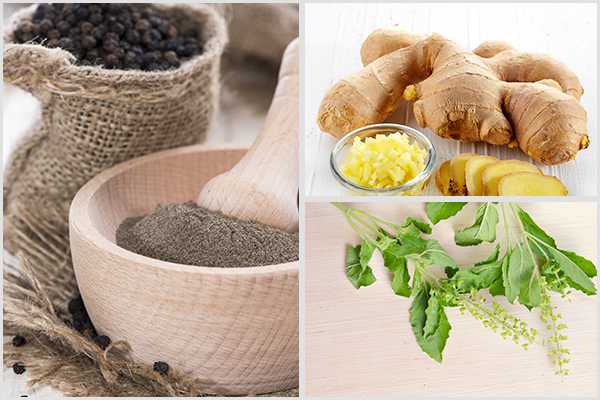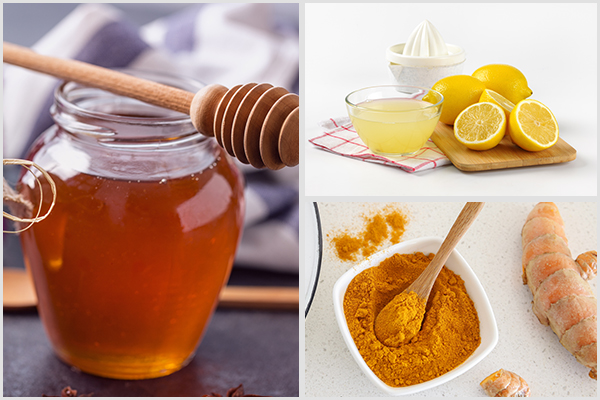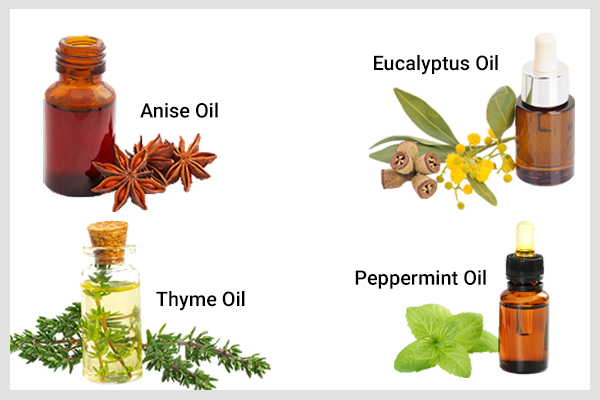In this article:
Decongestants are a class of medicines that are typically used to provide relief from nasal and chest congestion due to allergies, sinusitis, nasal polyps, or upper respiratory tract infections.

A major drawback of using topical nasal decongestants is the rebound congestion caused by the inflammation of the inner layer of the nose. (1)
Many natural ingredients offer the same benefits as topical nasal decongestants. They break down accumulated mucus, reduce inflammation, and thus bring relief.
Homemade Decongestant
You can easily make a natural decongestant at home by following these steps:
- Bring a cup of water to a boil and add 1” piece of ginger. Let it simmer for a few minutes.
- Add a pinch of crushed black pepper and turmeric powder, mix well and simmer for 2 minutes.
- Turn off the heat and add 4–5 fresh holy basil or tulsi leaves. Let it steep for 5 minutes.
- Add fresh lemon juice from 1 lemon and honey to sweeten before drinking.
- You can drink a tablespoon of this drink twice a day.
Each ingredient of this homemade decongestant offers the following benefits.
1. Holy basil
Holy basil, or tulsi, has a special place in the Ayurvedic medicinal system due to its ability to treat illnesses. It has natural anti-inflammatory properties and is used as a natural remedy for colds, coughs, and even earaches. (2)
It also has natural decongestant abilities and can effectively liquefy phlegm (mucus) to reduce congestion. It can be used for allergic bronchitis, asthma, and lung disease.
In a study, holy basil consumption eased breathing in patients with asthma. (2)
2. Ginger
Ginger is a root that is used to flavor dishes in many cuisines around the world. It is also used as a herbal remedy to treat colds and ease the symptoms of asthma, nasal congestion, and allergic rhinitis.
Studies comparing ginger to popular allergy medications found ginger to improve nasal symptoms and congestion but without the side effects of drowsiness, fatigue, or constipation. (3)

3. Black pepper
Black pepper is widely used as medicine in India and China for its capsaicin content. It is used for the treatment of vertigo, asthma, indigestion, sinusitis, and congestion. (4)
In one study, subjects experienced relief from nasal congestion, sinus pain and pressure, and headaches after the administration of capsaicin. (5)
4. Turmeric
Turmeric and its bioactive compound curcumin is a potent anti-inflammatory and anti-infection agent. Studies have found curcumin to bring relief from nasal congestion and reduce inflammation in colds. (6)
5. Lemon juice
Lemon juice is used in some European countries to provide relief from the symptoms of colds and flu. (7) Its vitamin C content is especially potent when it comes to treating and managing the common side effects of flu. (8)

6. Honey
Honey not only adds flavor to this DIY recipe but is also a potent antibiotic. It provides relief from common colds and upper respiratory tract infections, and it soothes an inflamed and irritated throat. (9)
Other Ways to Decongest
Aside from taking a decongestant, you can also try these measures to relieve the stuffiness in your upper airways.
1. Steam inhalation
The steam from hot water can be inhaled to soothe a stuffy nose and open the nasal passages during a cold and sinus infection.
2. Using essential oils

Some essential oils such as anise oil, eucalyptus oil, peppermint oil, and thyme oil can be used in aromatherapy to decongest and act as expectorants to bring relief from the symptoms of the common cold and other respiratory tract infections. (10)
3. Nasal irrigation/neti pot
Using a stream of water for nasal irrigation is a traditional Ayurvedic practice that can remove the buildup of mucus on the nose and provide relief, especially in children.
Traditionally, it involves using a pot filled with warm saline water, which is poured into one nostril and allowed to flow out of the other. Recently, many devices have become available that make this process easy. (11)
Nasal irrigation should be done with care and under adult supervision, especially if you are using this for your child.
Can Apple Cider Vinegar Help With Congestion?
Apple cider contains acetic acid, which can break down mucus and helps ease chest congestion. You can dilute a spoonful of the vinegar in half a glass of warm water and consume it. However, if you have an inflamed throat, be cautious as it may cause further irritation.
Final Word
Using natural remedies as decongestants during a cold or cough can be beneficial in the management of an illness. Many ingredients contain bioactive compounds that have protective roles against infections and can help break the mucus apart to provide relief.
When using natural remedies, just make sure to keep allergies in mind as well as other accompanying conditions that can make them ineffective or contraindicated.
- Was this article helpful?
- YES, THANKS!NOT REALLY


